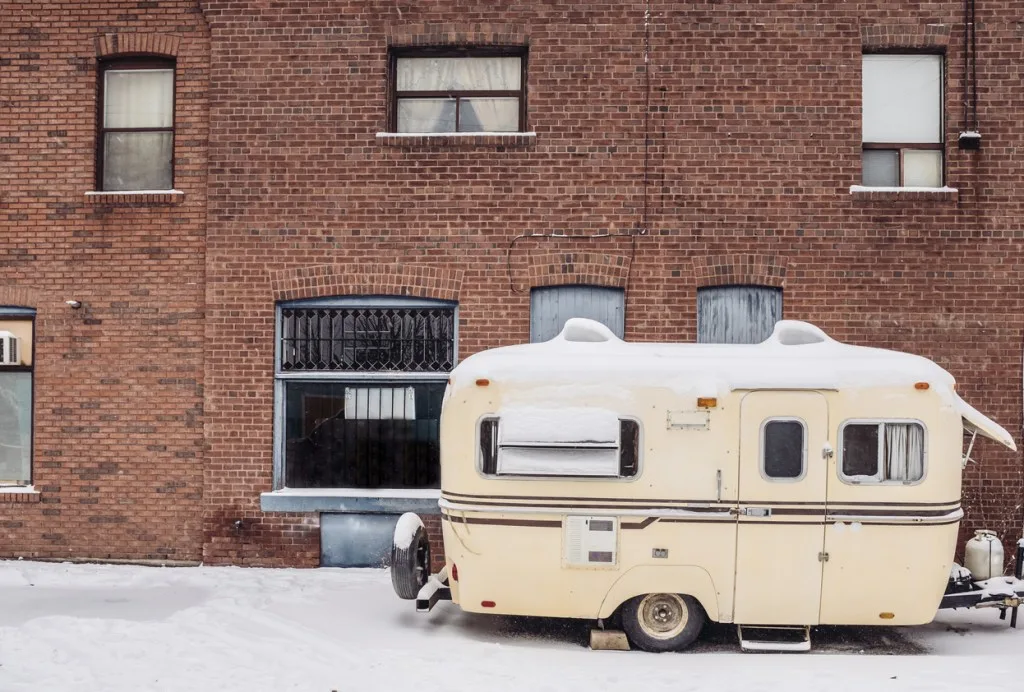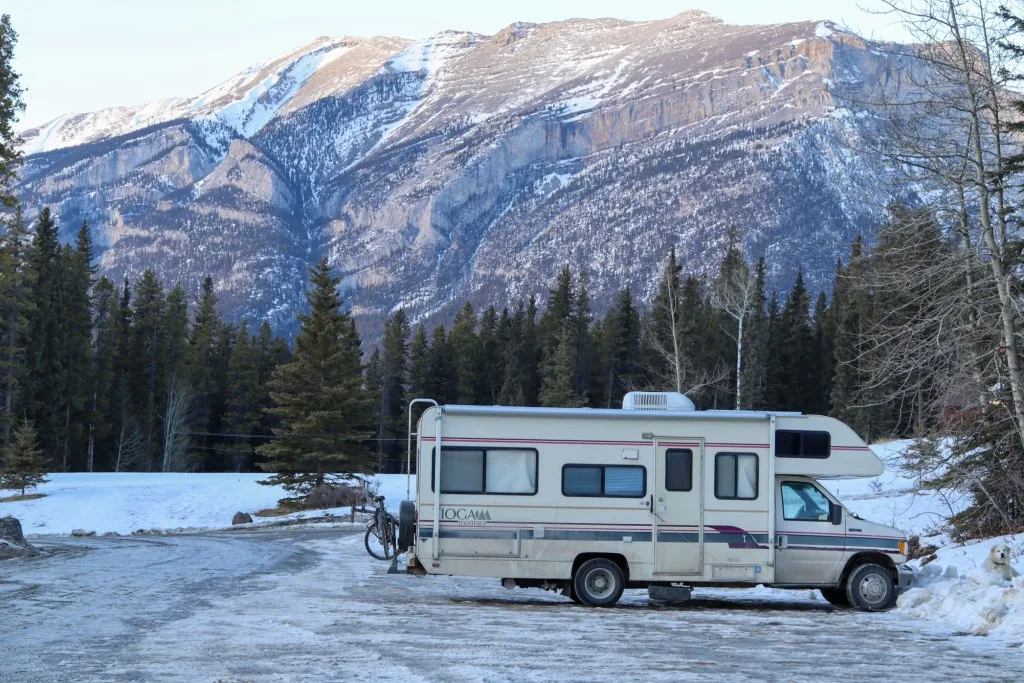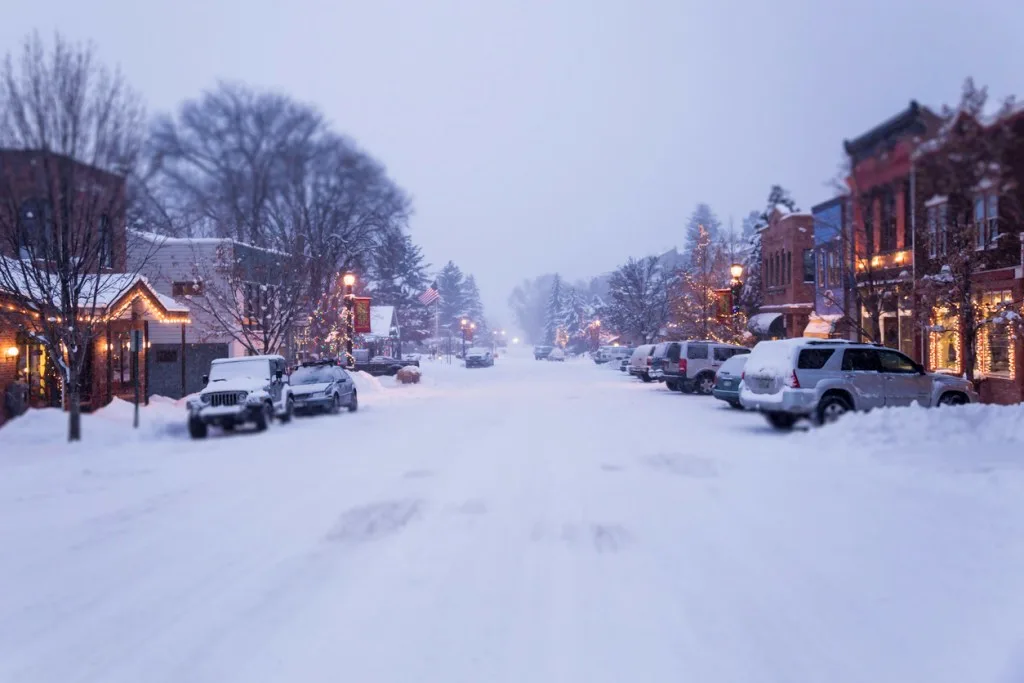Cold temperatures can sneak up on you fast. These chilly temperatures can not only make it uncomfortable for RVing but also wreak havoc by freezing your RV’s pipes.
If temperatures drop too much for too long, you may end up with extensive damage that you can’t ignore. But, can the damage happen in the span of one night?
Today we’ll share some tips for preventing your RV’s pipes from freezing while you RV in colder weather.
Let’s get started!

Why Do RV Pipes Freeze and What’s the Big Deal?
Whenever you expose water lines to freezing temperatures, there’s a risk that pipes will freeze. However, RV pipes are often more susceptible to freezing as manufacturers typically don’t over-invest in insulating RV water lines.
With the bulk of RVers using their rigs during warmer months, freezing pipes aren’t an issue the majority of RVers face while camping. However, it can be a big deal if you’re unlucky enough to experience them.
Water expands as it freezes inside of your RV’s pipes. While these plumbing systems can handle some expansion, there’s always a risk of failure. The fittings and other connections in your plumbing system can crack or come loose.
These failures can result in leaks in your water lines that, if they go unnoticed, can cause massive amounts of damage that isn’t cheap to fix.
How Cold Does It Have to Be for RV Pipes to Freeze?
Whether your RV pipes will freeze or not depends on several factors. Some RVs are capable of handling freezing temperatures better than others. Enclosed and insulated spaces protect the pipes on some RVs.
These RVs can experience sub-freezing temperatures for 24 hours or more without the pipes freezing.
RVs without special protections can freeze in a matter of hours if temperatures plummet. However, if temperatures hover near or slightly below freezing, it can take approximately 24 hours for your pipes to freeze.
If you’re not actively using your RV and heating the interior, your lines are more likely to freeze.
The further below freezing the temperatures drop, the faster your pipes will freeze.
Temperatures in the teens can freeze your RV pipes in a matter of hours. So make sure you take the proper precautions if the forecast calls for sub-freezing temperatures.
Can RV Pipes Freeze in One Night?
Your RV pipes can freeze in one night, especially if the temperatures dip well below freezing.
Temperatures in the teens or single digits can cause your pipes to freeze in a matter of hours.
If you haven’t winterized your RV and you’re expecting sub-freezing temperatures, you should winterize immediately to avoid damage.
Can Your RV Tanks or Water Heater Freeze?
Your RV tanks hold a generous amount of water, some up to 50 gallons or more. The more water in your tanks, the longer it will take to freeze. If you have a minimal amount of water in your tanks, there’s a chance it will freeze if temperatures are below freezing.
Some RVs come with insulated tank blankets that serve as electric blankets that you can turn on to help avoid your tanks freezing.
If you’re actively using your water heater, you don’t need to worry about it freezing. As long as you keep water in it and actively heat it, the water will stay well above freezing.
However, if your RV is sitting unused or in storage, drain your water heater completely. This is a standard part of winterizing your RV at the end of the camping season.

7 Ways to Prevent Frozen RV Pipes
Here are a handful of tips to prevent your RV pipes from freezing. It’s important to note that just doing one of these tips likely isn’t going to be enough during extreme conditions.
However, a combination of these tips will give you the best chance to fight those freezing temperatures and avoid frozen RV pipes.
1. Insulate Your Pipes
One of the main reasons your RV pipes will freeze is due to a lack of insulation. Wrapping your sensitive pipes with insulation helps protect your water lines from freezing. One of the perks of doing this is that you can forget about it once you insulate the lines.
Your water lines will have protection whenever the next cold temperatures come your way.
This tip is a great piece of preventive maintenance that you can do any time of year. It’s best to do this during warmer temperatures, so you don’t feel rushed.
Take your time and do the best job possible to give your RV pipes the best chance in your fight against cold temperatures.
2. Leave Cupboard Doors Open
By leaving your cupboard doors open, you allow warm air to enter the space. This can allow warm air to flow into these normally closed-up spaces. This helps keep temperatures up and avoids any chance of pipes freezing in them.
There are often cabinets below your kitchen and bathroom sinks containing sensitive water lines for your plumbing system.
Open those, too.

3. Use a Heated Water Hose
A standard RV water hose will put up very little fight against freezing temperatures. When these hoses freeze, the water inside them will expand and damage the areas where they connect to the RV and water spigot.
RV water connections are typically plastic, which doesn’t respond well to expansion. When this expansion occurs, cracks can form and create a mess once the ice melts. Heated hoses keep the water above freezing, which protects your water connections from damage.
While heated RV water hoses are often substantially more expensive than typical RV water hoses, they’re worth it. The cost of fixing damage caused by a frozen water hose can be multiple times your investment in a heated water hose.
4. Put a Space Heater in Your Basement
Some RVs come with heat ducts that pump warm air into the basement. However, not all RVs do. If your RV doesn’t have vents to pump air into your basement, placing a small space heater in your basement can help keep temperatures above freezing.
Make sure you take safety precautions to avoid any potential dangers with running a space heater. Ensure there’s plenty of room between the space heater and any items that could catch fire.
If you’re shopping for a space heater, ensure it has auto-safety features to shut off in an emergency.
5. Skirt Your RV
Because RVs sit off the ground, gusts of cold air can surround them. If the wind is especially cold, this can magnify the chances of your RV pipes freezing. Skirting your RV is a great option for blocking these cold winds from blowing under your RV. However, due to the intense work and setup required, this is likely only an option to consider if you’re staying in one place for the winter season.
RV skirting surrounds the bottom of your RV and blocks the cold air.
The materials used for the skirting can range from foam insulation board or hay bales to custom-made fabrics that fit your unique RV setup. However, cheaper options can let in rodents, and more expensive options can break the budget.
6. Insulate Your RV Walls (or Upgrade Your Insulation)
RV manufacturers typically don’t overdo it when it comes to insulation. If you’re able to insulate or upgrade the insulation of your walls, it can do wonders.
One of the best ways to do this is to wait for a cold day and feel around the inside of your RV for where you feel cold air entering. Some RVers have found that outdoor kitchens, cabinets, and drawers are all places that tend to lack insulation.
Stopping the cold air from entering your RV can not only keep the inside of your RV warm but also help you fight against frozen pipes.
7. Run a Trickle of Water
Water that’s moving has a harder time freezing than water that’s standing still.
So if you expect cold temperatures, allow your faucets to trickle. You’ll likely only want to attempt this if you’re using a heated water hose and are connected to a campsite with full hookups.
This helps avoid any chance that your water tanks will fill up, leaving you to wake up to a flooded RV.
Keep Yourself and Your RV Pipes Warm This Winter!
Winter camping can be a great way to camp and avoid crowds. However, it does come with its own unique set of challenges.
However, by taking some preventive steps and following some of our tips, you’ll have a great camping experience and keep your RV pipes from freezing.
Have you ever had your RV pipes freeze while camping?
Discover the Best Free Camping Across the USA
To be honest with you, we hate paying for camping. There are so many free campsites in America (with complete privacy).
You should give it a try!
As a matter of fact, these free campsites are yours. Every time you pay federal taxes, you’re contributing to these lands.
Become a FREE CAMPING INSIDER and join the 100,000 campers who love to score the best site!
We’ll send you the 50 Best Free Campsites in the USA (one per state). Access the list by submitting your email below:
I have wondered if PEX pipes can freeze and thaw repeatedly, without damage. This is reported true, but I have not confirmed. I know that PEX pipes are more expensive than PVC and thus expect them not to be used by OEM parts suppliers. This would of course not protect tanks and plastic fittings and valves.
I found the best way to prevent my pipes from freezing was to blow the water out of the lines. I used this technique when I travel from Boston to Florida during vacation last year. Once I got in the habit the whole process took less than 15 minutes.